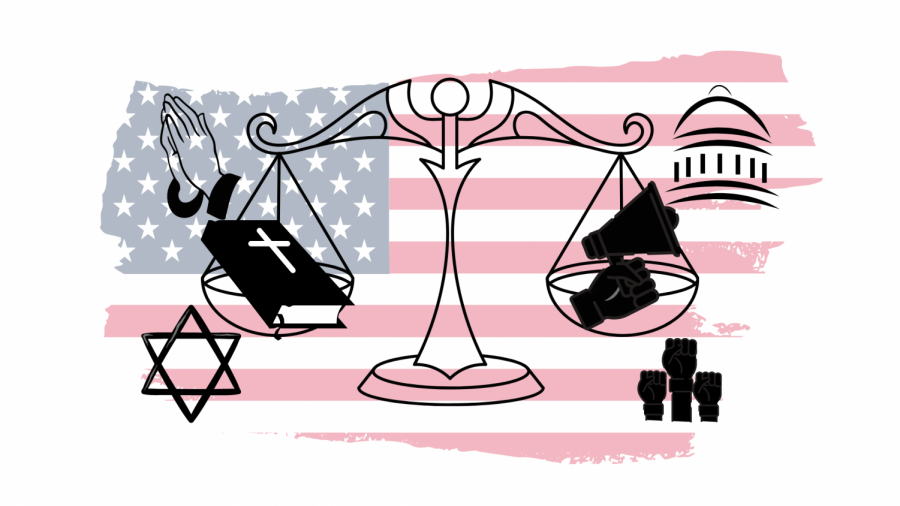Religious reasonings agitate contentions in American politics
February 26, 2021
Religion in the US government, particularly in the legislative branch, has been misconstrued, convoluted, and corrupted for self serving purposes, and a reevaluation of what religion means is necessary in reducing conflicts in Congress.
Numerous issues in American politics over the past several decades have become religiously infused, which only seems to increase discord. Christianity in particular, as a majority religion in the US, has become associated with issues like the legalization of abortion and gay marriage, as Christian beliefs have, in many places, become synonymous with Republican Conservatism. This has caused backlash from non Christians throughout the country who feel that it is an unfair imposition of religious beliefs in what is supposed to be a nation with religious freedom.
Unfortunately, a lack of understanding from both sides of the aisle, along with ignorant lapses in judgment, have been preventing any hope of resolution.
The first major problem is the assumption of Christianity and Conservatism being one and the same. At one point, many conservatives were Christians, having grown up in an era when religion was more central to more people’s lives. More recently, the thought became that all Christians must be conservative, evolving into the naive notion of many conservatives that their political opinions are perfectly in tune with Christian doctrine. This is a flawed view of what the Christian Bible teaches. In fact, based on biblical accounts, Jesus’ teachings–while too conservative for many liberals–would have been far too liberal for most conservatives. (In fact, that is the exact reception Jesus received from the conservatives and liberals of Judean society circa 30 C.E.). Christianity may have doctrine with implications towards political minutiae, but above all it teaches love, forgiveness, and acceptance. As a Christian, I believe that both christian politicians and the church as a whole have failed to uphold these core values over the past century.
However, a greater understanding of what religion really means could be helpful for those asking Christians to keep their religion from influencing their politics. Religion is neither a set of moral principles or opinions, nor even a cultural worldview. To a believer–whether Christian, Muslim, Jewish, Hindu or anything else–religion is the most basic understanding of truth, therefore dictating their actions, beliefs, and politics out of the message of what they believe to be universal truth. An atheist’s views function similarly, stemming from what they believe to be universal truth. While it isn’t right for religiously affiliated politicians to impress all of their beliefs on others in a country that protects religious freedom, it is important to note that religion will influence individual politics, and a call for the abandoning of religious foundations is not entirely plausible. Perhaps imagine the err in a Christian wanting an atheist to form their political views from the teachings of the Bible.
So the question remains: how does a theist believing in an absolute truth make peace, change, and laws alongside other theists and atheists believing in a different absolute truth?
Resolution begins with mutual understanding. Politicians (and all citizens) need to make an effort to understand the beliefs and foundations of those they disagree with. This won’t cause everyone to agree, but it may lead to healthier, more respectful, and more productive discussions. Additionally, Christians (and all theists) should learn to keep religious doctrine from being the sole reasoning for their political movements and opinions. It makes sense for religion to inform personal values from which political stances can be derived, but that alone will only serve as a roadblock when working in a diverse legislature. Thoughtful reflection on personal religious doctrine and the logical procession of its implications will serve any theist better than volatile reactions in line with the masses of mutual consenters.
In such a polarized society, it is important to work at understanding the thoughts and reasonings of those we disagree with. Only then will we improve, and only then can we progress. (It is also important to really understand what you think you believe, and why.) I will end with the prayer of a muslim imam, at the opening of a California Senate meeting, which beautifully depicts what it could look like to be a thoughtful politician with a religious background: “As people of faith, we pray with all people of faith, that the bond of trust be strengthened between those who govern and the governed. Bless this Senate, and all the branches of government, to work together in helping to raise the quality of life through all our cherished institutions . . . Make our intentions honorable and excellence the goal of all our strivings in building a better California and thus a better America for us all.”



